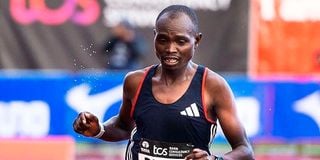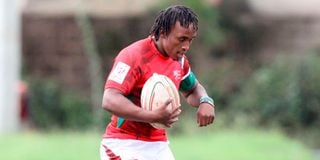ADAK suspends 33 Kenyan sportsmen and women for doping

Kenya's Joshua Belet crosses the finish line to win the 2023 TCS Amsterdam Marathon in Amsterdam on October 15, 2023.
What you need to know:
- Among the suspended athletes is 2023 Amsterdam Marathon champion Joshua Belet
- Also suspended is KCB rugby player Brian Wahinya who once played for the national team.
An unprecedented 33 sportsmen and women have been provisionally suspended by the Anti-Doping Agency of Kenya (ADAK) for violating various doping rules.
Those suspended include 26 from athletics, with other cases being three each in basketball and rugby and one from handball.
This is the highest number of athletes ADAK has suspended for doping since January last year when they raised the red flag on 20 athletes.
Among those who have been suspended is 2023 Amsterdam Marathon champion Joshua Belet and KCB rugby player Brian Wahinya.
Belet, 26, has been suspended for the presence of prohibited Anabolic Androgenic Steroids, Testosterone, Adiol, Pregnanediol, Androsterone and Etiocholanolone.
He represented Kenya in marathon at last year’s World Athletics Championships in Budapest, Hungary.
ADAK has further completed 16 cases to announce varying bans of up to a maximum of four years.
ADAK legal officer Bildad Rogoncho attributed the increased doping cases to enhanced testing after the government boosted the anti-doping programmes in the country with Sh600million annually.
Rogoncho said the funds have enabled them to visit camps countrywide to conduct more out-of-competition testing, especially on second and third-tier competition athletes.
“We didn’t have most of these athletes’ data due to lack of resources but we are now empowered to reach many and we want to thank Athletics Kenya for this,” said Rogoncho.
The ADAK’s legal officers said all those who have doped won’t sneak out to compete since their travel documents will be flagged down at the immigration.
“We are also collaborating with other national anti-doping agencies outside the country to have them test Kenyan athletes in any race around the world,” said Rogoncho.
“Some of these athletes have been going to compete in smaller races, even in Peru, thinking we are not based there.”
Belet, who claimed bronze at Hamburg last year, failed to finish his race in a championship where Kenyan athletes missed out on the podium places.
Last year marked his debut season in the full marathon.
Also suspended are Dorcas Jepchumba Kimeli, who represented Kenya at the 2020 World Half Marathon Championships, finishing 11th and the 2012 World Under-20 5,000m champion David Kiprotich Bett.

Brian Wahinya during a training session with the Kenya Sevens team on May 9, 2019.
Jepchumba has been accused of tampering or attempted tampering with any part of doping control while Bett’s samples had the presence of prohibited substance 19-norandrosterone.
Sprinters Duke Osoro Ogoti and Joan Jeruto are also in the list of the suspended athletes.
Ogoti tested positive to Anabolic Androgenic Steroids while Jeruto evaded, refused and failed to submit to sample collection.
Wahinya, a former Kenya Simbas and Kenya Sevens player, has been suspended alongside fellow rugby players Charlton Mokua and Zeden Lutomia Marrow (both of Kenya Harlequin).
The three have been suspended due to the presence of the prohibited substance Cannabinoids which is linked to cannabis sativa.
Basketballers Alex N'sasse Ramazani and Albert Einstein Onyango Odero (Nairobi City Thunder) also face similar charges for the presence of Cannabinoids.
Another basketballer James Mwangi Maina (Nairobi City Thunder) had the presence of prohibited substance stimulants/methylenedioxymethamphetamine.
Rogoncho said the affected athletes have the opportunity to argue their cases before a final decision is made.
“If they consumed cannabis sativa just before the matches that is a straight two-year ban. However, if they took it out-of-competition and can prove that they didn’t use it for performance enhancement then they will get three months,” said Rogoncho.
“If they plead guilty and accept to go for rehabilitation then they will get a one-month ban.”





